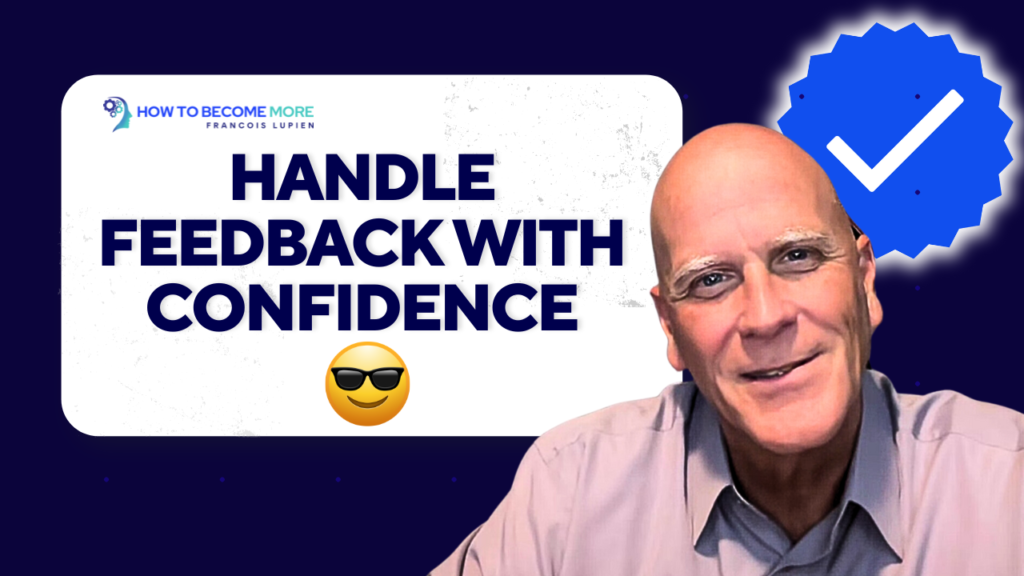As a CEO or business leader, learning how to handle criticism is crucial for resilience and growth. Whether it’s feedback from your board, your team, or external stakeholders, handling criticism can feel like walking a tightrope. On one hand, you need to be open to feedback to grow and improve; on the other, it’s all too easy to let negative comments undermine your confidence and shake your belief in your vision.
If you’ve ever struggled with processing criticism in a way that doesn’t lead to self-doubt or second-guessing your decisions, you’re not alone. Today, we’re going to dive deep into this topic and explore how you can transform criticism from a stumbling block into a stepping stone toward greater leadership and personal growth.
Why Criticism Hits So Hard for CEOs and How to Turn It into Growth

Let’s face it—criticism stings. As a leader, you’ve poured your heart, soul, and countless hours into building your business, guiding your team, and making strategic decisions to drive growth. When negative feedback comes your way, it can feel like a punch to the gut, threatening to unravel the confidence and certainty you’ve worked so hard to build.
But why does criticism hit so hard, especially for those at the top? Often, it’s because your identity as a leader is closely tied to your ability to make the right decisions and lead with conviction. When someone questions your approach or decisions, it can feel personal—a direct challenge to your competence and authority.
This is where many CEOs get stuck. Instead of viewing criticism as an opportunity for growth, they see it as a threat to their credibility and leadership. And that’s when the self-doubt starts creeping in—making you question your capabilities, your decisions, and even your worth as a leader.
The Truth About Criticism for CEOs: It’s Inevitable and Valuable for Leadership Growth

Here’s the thing: criticism is not only inevitable—it’s also incredibly valuable. The problem isn’t the criticism itself; it’s how we interpret it. Too often, we allow negative feedback to seep into our minds and create doubts that didn’t exist before. We take it personally, internalizing the comments as a reflection of our worth instead of viewing them as an external perspective.
But what if you could change the way you look at criticism? What if, instead of seeing it as a threat, you could see it as a gift—a tool that, when used wisely, could sharpen your skills and broaden your perspective? The most effective leaders understand that criticism, when approached with the right mindset, is a gateway to growth and self-improvement.
Shifting Your Mindset: From Defensive to Open
The first step in transforming criticism into growth is shifting your mindset from a defensive stance to an open one. It’s natural to feel defensive when someone criticizes your work—after all, you’ve put so much effort into it. But defensiveness closes the door to learning. It prevents you from seeing the valuable insights that might be hidden within the feedback.
When you shift your perspective, criticism becomes less about proving yourself right and more about exploring what you can learn. This mindset doesn’t mean that every piece of criticism is valid or that you should accept all feedback without question. It means being willing to consider different viewpoints, even if they challenge your current beliefs.
How to Process Criticism Without Losing Confidence

Processing criticism without letting it shake your core requires a structured approach. Here are some strategies to help you turn criticism into a tool for growth:
- Pause Before Reacting: When you first receive criticism, resist the urge to react immediately. Take a moment to breathe, process the words, and separate your emotions from the feedback itself. This pause allows you to respond thoughtfully rather than react impulsively.
- Seek the Truth in the Feedback: Not all criticism is created equal, but there’s often a nugget of truth in every piece of feedback. Instead of dismissing criticism outright, ask yourself, “What can I learn from this?” Look for specific areas where you can improve, even if the feedback wasn’t delivered in the most constructive way.
- Don’t Take It Personally: Remember that criticism is about your work or your decisions—not about you as a person. By detaching your self-worth from the feedback, you create space to see the criticism objectively and use it to your advantage.
- Consider the Source: Evaluate who is giving the feedback and their level of expertise or perspective on the issue. Is it someone whose opinion you respect? Is it coming from a place of constructive intent? Understanding the source can help you determine how seriously to take the feedback.
- Use It as a Catalyst for Growth: Once you’ve identified the useful elements of the feedback, use them to fuel your growth. Set specific goals based on the insights you’ve gained and create a plan to address the areas of improvement. Let criticism be the spark that ignites your journey toward becoming a more effective leader.
The Role of External Support in Handling Criticism
One of the most powerful ways to handle criticism is to seek an external perspective. Imagine having someone in your corner who can help you see the feedback objectively, without the emotional baggage. This is where a trusted advisor or coach can make all the difference.
As a CEO, it’s easy to get caught up in your own bubble, surrounded by people who may not always challenge your ideas. An executive coach can offer you a fresh perspective, guiding you through the process of interpreting criticism and uncovering the hidden value within it. They can help you turn negative feedback into actionable insights that drive both personal and professional growth.
Turning Criticism into a Tool for Leadership Excellence
When you embrace criticism as a tool for growth, you transform the way you lead. Instead of fearing negative feedback, you begin to welcome it as an opportunity to refine your skills, clarify your vision, and strengthen your leadership. You start to see criticism not as a setback but as a stepping stone that propels you forward.
Great leaders are not defined by their ability to avoid criticism; they are defined by how they respond to it. They use every piece of feedback—good or bad—to sharpen their focus, to learn, and to grow. They understand that their journey is one of continuous improvement, and criticism is simply part of that process.
Let’s Transform Criticism into Your Greatest Asset
If you’re a CEO or business leader struggling to handle criticism without letting it derail your confidence, I invite you to reach out. Let’s have a confidential conversation where we can explore how you can shift your perspective and turn criticism into your greatest asset.
Our discussions will provide you with the clarity, support, and actionable strategies you need to transform feedback into fuel for your future success. Together, we’ll unravel the emotional weight of criticism and reveal the opportunities for growth hidden within it.
Are you ready to transform feedback into a leadership growth tool? Schedule a confidential coaching session today!
This is Francois Lupien, and I’m here to guide you on the path to becoming the leader you were always meant to be. Don’t let criticism hold you back—let’s turn it into a stepping stone toward your most resilient and effective self.
Schedule your confidential conversation with me today, and let’s turn feedback into the key that unlocks your true leadership potential. Remember, even the most successful leaders grow stronger through every challenge they face. Let’s make that growth a reality for you.

Click Here To Watch The Video
Ready to start your confidential conversation? Reach out to me today, and let’s uncover the leader you’re destined to be.





